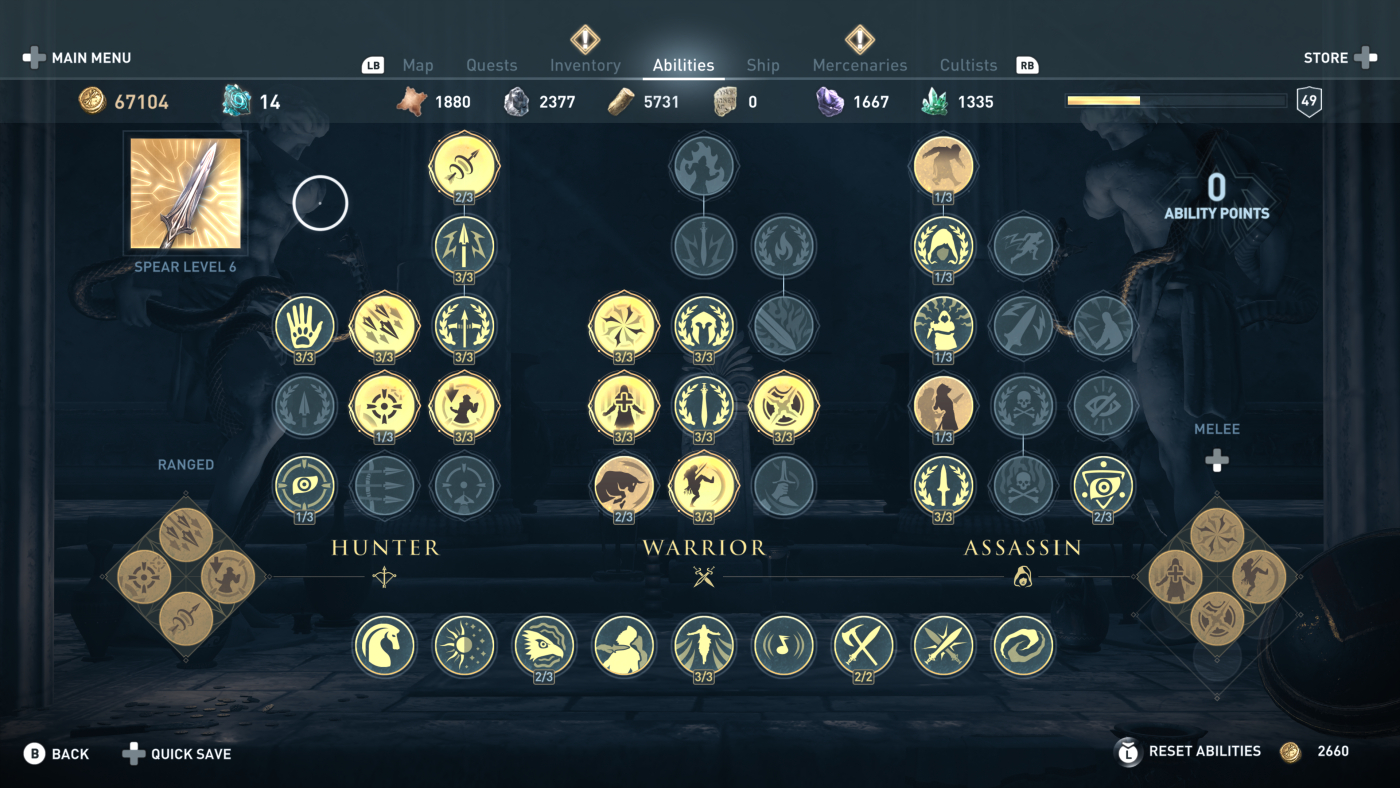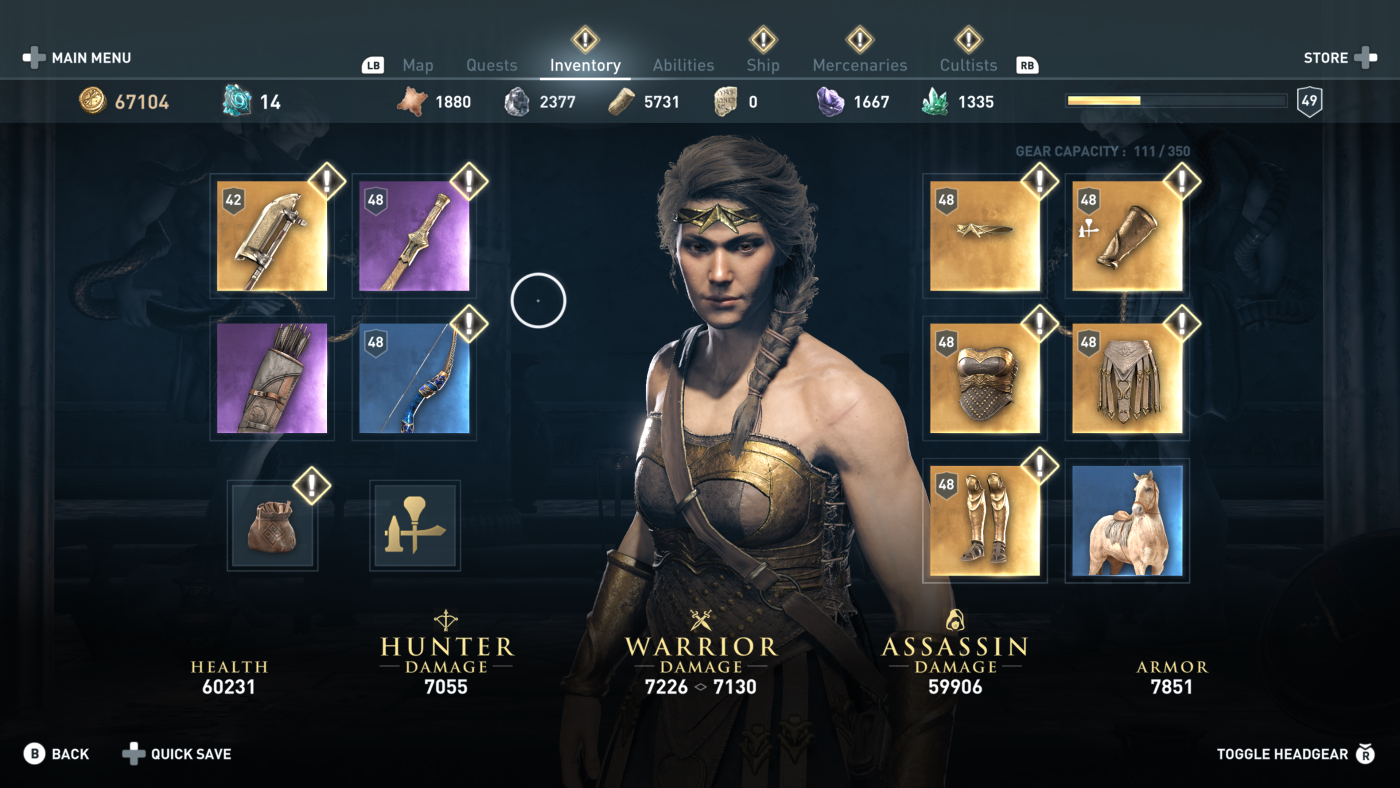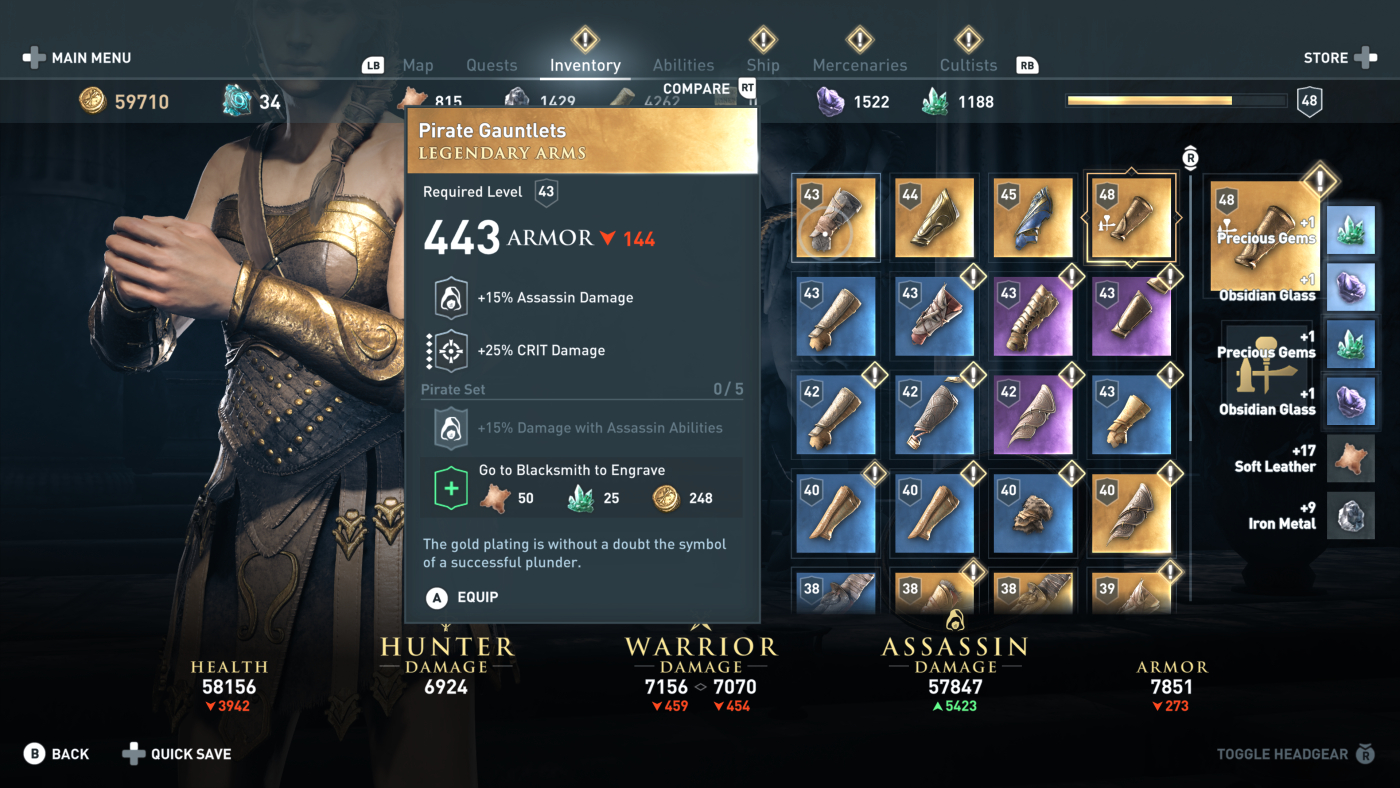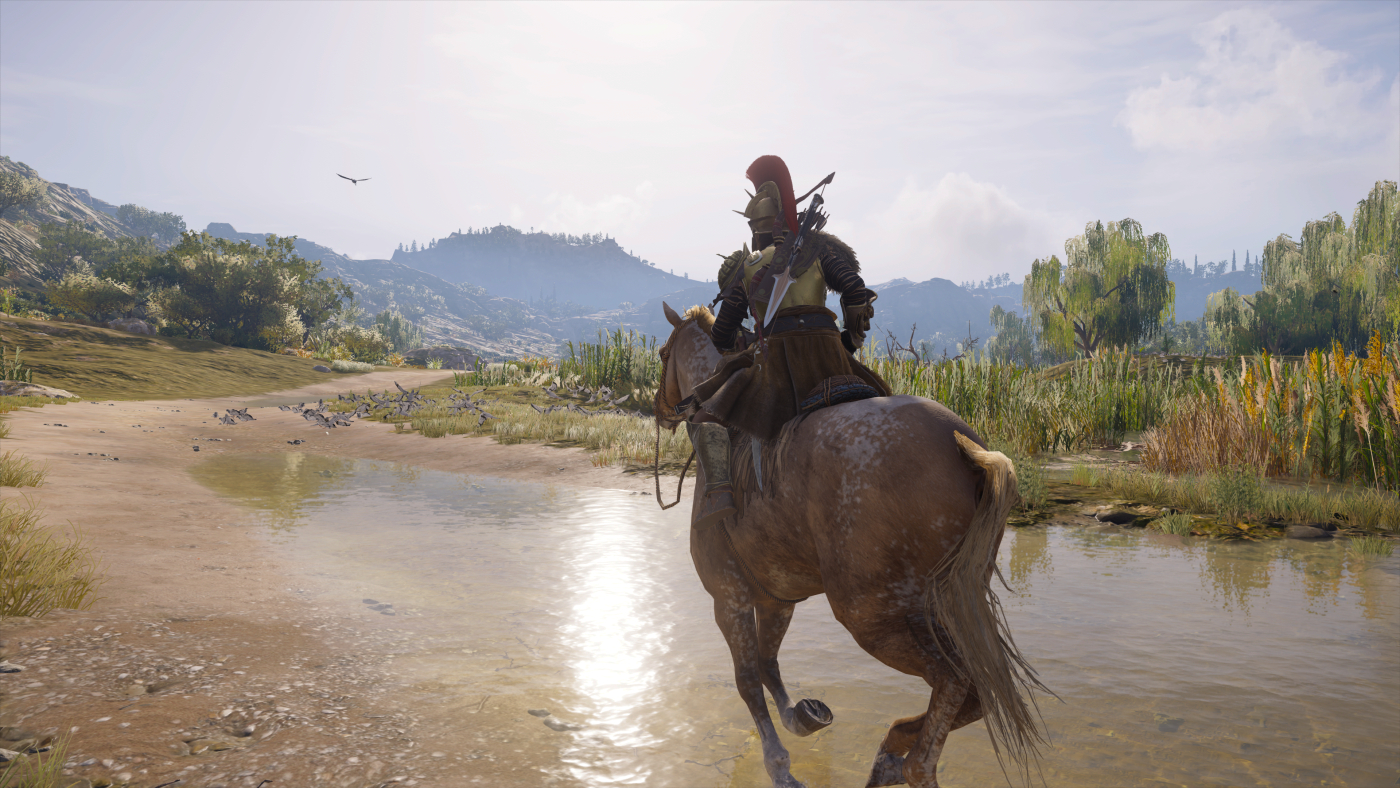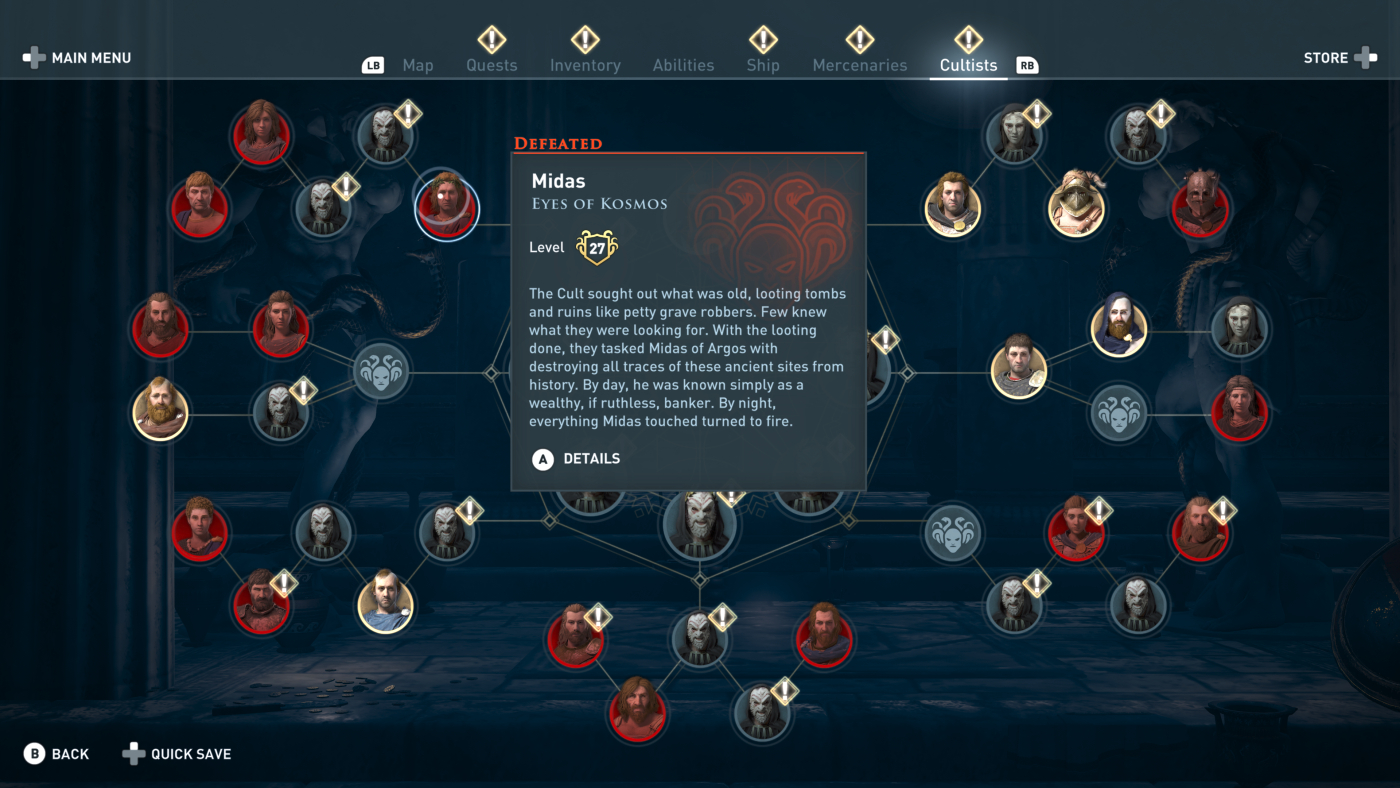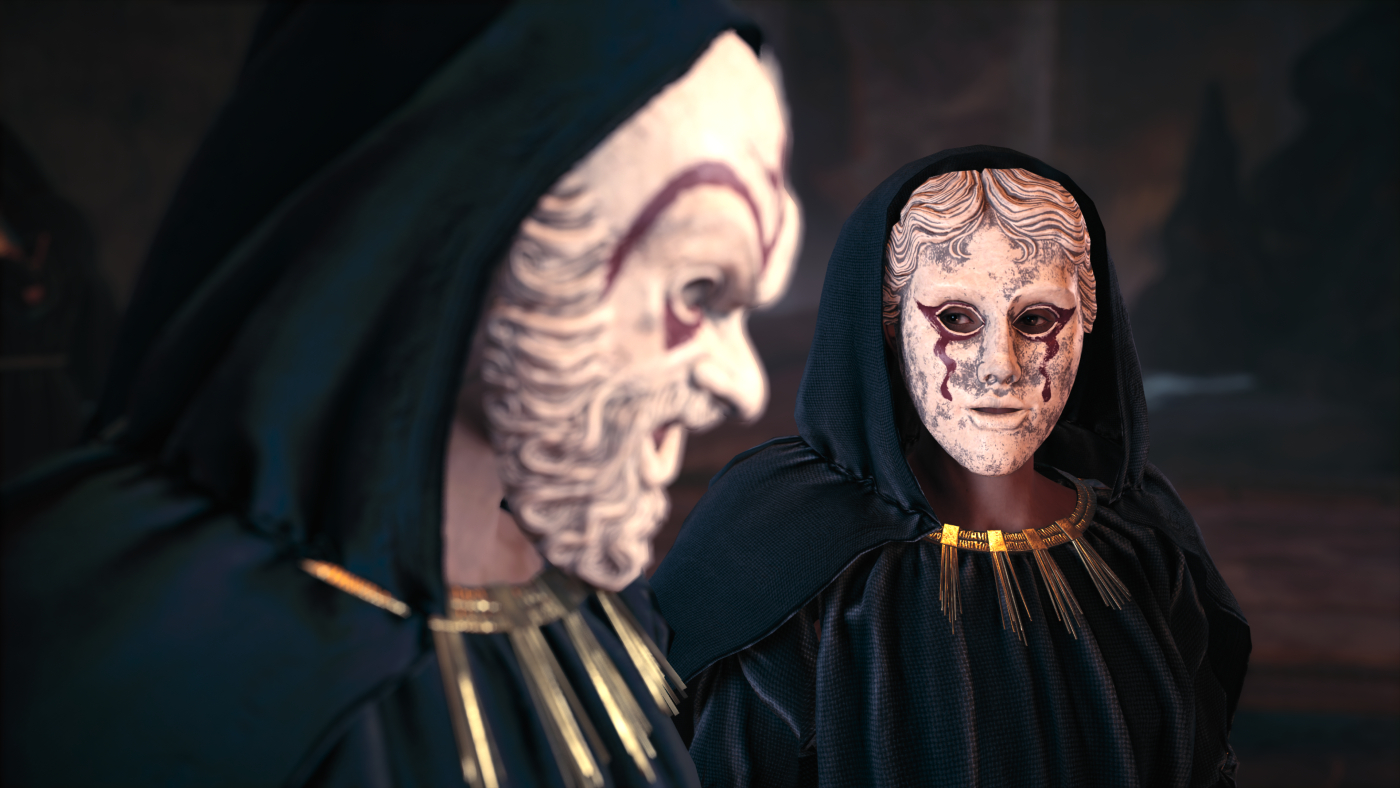Get your Greek on.
Assassin’s Creed Origins was, in many ways, a complete reboot of the series. It refreshed nearly every aspect of the franchise down to its combat, controls, open world exploration, and how it integrated the current day narrative that the series has been mostly criticized for. Origins was also the first Assassin’s Creed that I had seen to completion, a series that I had for the most part, merely danced around. While I was quite taken with Origin’s use of Egyptian history, albeit a mostly fictional one, Its mechanical flaws and mediocre side-quests held it back from being a truly remarkable game. While some of those flaws still exist here in its follow-up, Odyssey improves greatly on its open world, its quests, and offers us a better game overall.
At its very core, Odyssey is a game built around family. You’ll choose from either of the two siblings; Kassandra, or Alexios. Either choice will see you playing as the older of the two children and it’s not long before you are shown a traumatic event that sees you separated from your family. While you will dip into the current day aspects of the series a short few times, Odyssey’s main focus is told around your journey to have your Spartan family reunited, no matter the cost. For the first time in the series, you’ll be prompted with dialogue choices and branching paths, allowing you to affect the ending based on those choices. While it’s unclear how the different endings will affect the larger story at play when it comes to future titles or its planned DLC, the differences may end up being fairly minor in the overall narrative. Given that Origin’s has no real bearing on the events that occur here, I’m more inclined to believe that these choices are relevant to this title only.
Much of my time with Odyssey was seen through the eyes of Kassandra. Between the two siblings, I found her to be the most interesting and offered a better performance overall. While much of the dialogue is shared, Melissanthi Mahut’s vocals bring Kassandra to life with an abundance of wit, charm, and a ton of attitude. Hearing her berate a quest giver about why she’s taking time to retrieve some missing wood made me laugh out loud with a heated “I’ll get it when I’m good and ready” response. Alexios, as played by Michael Antonakos can have his moments to shine as well, but he can come off as a bit “loud” during scenes that require subtly. Ubisoft also went the extra mile by having these characters react differently, complete with unique animations, dialogue, and facial expressions that compliment each of their respective personalities. As it stands, there is no best character as each will bring something different to the role and compliment your choice to replay the game.
Odyssey’s greatest strength lies in its depiction of Ancient Greece. Not since the Witcher 3: The Wild Hunt, have I been so impressed with how alive and feature rich an open world can be. While Origin’s contained a wonderful recreation of ancient Egypt, much of the map was wasted with massive locations that contained nothing more than paths through empty mountain ranges and valleys. While the same could be said for the vast ocean offered up here in Odyssey, you always have the opportunity for some epic ship to ship battles that never fail to disappoint. Odyssey’s locations also feel far more dense, allowing for a much greater emphasis on its parkour system and its hidden caves and tombs. Athens, which represents one of the larger environments here, is beyond massive and contains a staggering amount of detail and on-screen population.
A few hours into the game will see you gain access to a boat, allowing you to leave your current home behind and see all that Greece has to offer. While there are several large land mass locations that you’ll spend dozens of hours exploring, there is a vast collection of islands that will entertain you for just as long. I’ve journeyed to small islands only to end up spending hours digging into multi-part quests, animal hunts, or traveling to villages in the middle of nowhere to track down clues towards the game’s Cultist system or its few larger-than-life mythical creatures. Every location present in Odyssey feels largely handcrafted and purposeful, giving me all the more reason to explore every inch of its vast open world. Odyssey also includes several gigantic statues, and while several of them are lacking clothes altogether, you can’t help but climb all the way to the top, with maybe a crude stop along the way.
As you strike down innocent civilians or commit crimes all over Greece, you’ll be hunted by randomly generated mercenaries. These threats have their own menu tab complete with information about them and the rewards for defeating them. The more crimes you commit, the higher your bounty will go, requiring you to either kill the person who placed the bounty on you in the first place, eliminate all those attempting to hunt you down, or pay the bounty fee altogether. This system plays out much like the 5-star system in Grand Theft Auto as the game will toss more and more threats your way should you dig yourself in deeper. I did find that Odyssey is far less forgiving on being discovered as enemies will react to you far faster than how it played out previously in Origins.
Odyssey, through its roughly 60-70-hour campaign, rarely looks to recognize itself as a traditional Assassin’s Creed game. While you can assassinate various targets and interact with the environment in ways similar to that of Origins, it’s made very clear that Ubisoft is looking to take the franchise to newer and more complex heights. As was the case with Origins, RPG elements play a significant role here. As you level up, you will earn skill points that you’ll use to equip new abilities or gain passive skills like increasing your damage, defense, or prevent certain hunter skills from using your standard arrows. You will earn experience from discovering new locations, defeating enemies, completing quests, or taking out numerous well-guarded bases. While there has been much talk about how the game is structured to benefit from its paid XP boosts via the online store, I’ll get into that controversy a bit later on in the review, but I will state that I never once felt compelled to purchase anything offered to boost my progression up the available skill trees.
One of the many issues I had with Origins was its cookie-cutter side-quests that were not terribly well written or featured interesting conversations around them. While a few of the quests offered here in Odyssey tend to be a bit on the bland side, the writing in both dialogue and the context to the quests themselves are far better in nearly every way. I was pleasantly surprised at how engaging the side activities were this time around, a game that was more or less developed alongside Origins. Whether it was being double-crossed by an elixir-maker, hunting down business rivals or cheating spouses, or investigating the mystery of a so-called “Minotaur”, I found myself completing each and every quest I came across. While there are certain aspects to some side quests that let you complete them in different ways, the main story itself features several instances where you can alter how characters, later on, will react to you. In my efforts to talk down one of the Cultists, a man who was forced to do their bidding, my actions early on in my adventure caused him to react violently towards me. While I was still able to complete the quest, I didn’t get the conclusion that I wanted, and was forced to kill him.
For as much as I don’t want to keep on mentioning Origins, because frankly, I’ve probably compared the two games well over a dozen times here with no plans on stopping, I did find that Origins did offer up a bit better variety in the main quest than what is present in Odyssey. Some of my favorite missions in Origins was squaring off against massive War Elephants or firing off a billion arrows on the back of a chariot during a high-speed chase. These moments are not present in Odyssey in any respect as every encounter is based around either stealthing enemy bases to eliminate a political leader, joining in on massive battles between Athens or Sparta, or taking to the ocean for some high seas warfare. While the future of its planned DLC may solve this issue, Odyssey can feel less impressive for how it chooses to structure its missions, even if the context of the mission is far better written.
During your time with Odyssey, you will encounter characters that can be romanced in some way. While romancing companions is certainly old hat to various other RPG’s, the way in which Odyssey handles it is far more hollow than the likes of what we’ve seen in Dragon Age or Mass Effect. As you chat up characters through a variety of side quests, you will have the option to essentially flirt with them, throwing out cheesy pick up lines whenever the chance is given to you, even if these lines come completely out of nowhere. These moments end up being nothing more than a scene or two with no real relationship to follow. There are several characters that can be romanced with only a select few sticking around with you in some fashion. Kyra, a woman on the island of Mykonos, who is part of a rebellion, was a fantastic character that I wish I could have made into someone more permanent for Kassandra. Not only is her character model utterly fantastic, but she felt so perfect for what I wanted for my Kassandra. Once my mission with her was over, she essentially faded away into the black and was never mentioned again. While I enjoy the fact that Odyssey gave us this option, these moments felt wasted and largely pointless.
With Origins, Ubisoft had started to implement a variety of items that you could equip to Bayek to not only change up the tools he used in combat but his overall look as well. Odyssey takes this one step further and adds in separate armor pieces to add defense to your head, body, waist, arms, and legs. Each of these items comes with a defensive stat plus other perks like dealing additional damage based on the three available skill trees; Warrior, Assassin, and Hunter. These same stats translate to your weapons as well with additional perks like dealing more fire or poison damage or bonus damage when using certain skill abilities in combat. Overall, you will be rewarded with a massive amount of loot through various means that you can either equip, dismantle into components, or sell at any of the available blacksmiths that you encounter. The components that you collect from either finding in the world or through this dismantling can be used to upgrade your weapons or use those resources to upgrade your ship, making it far more formidable in combat.
For your weapons, you’ll have access to swords, daggers, heavy blunt hammers and maces, staves, spears, and various heavy bladed instruments of death. You will also have a bow that is absolutely crucial to the ensemble as it can bridge the gap between you and your foe with a wealth of special arrow abilities that can result in your enemy being knocked so far back that they won’t get back up. I usually would equip a sword and a long handled axe to give me variety in the distances I could attack from. Despite those bladed options, many of my kills were through my bow. My biggest complaint with the bow is that you will run out of arrows incredibly fast and while you can jump into the menu and craft some more, a game like Horizon: Zero Dawn, which allows you to craft arrows in the middle of combat, made having to pause the game, select your inventory, then select the quiver, then select the arrow type and craft them, to often ruin the flow of combat during every encounter. While the skill ability to not consume arrows via your special attacks did help this in certain ways, it doesn’t fix the problem that other games have solved in recent years.
While Odyssey features a lock-on system to make battles a bit more personal or a dodging system that never really feels that useful, you will often rely on building up your stamina in order to pull off brutal special attacks that you’ll put skill points into and then map to various face buttons. These abilities range from a devastating Spartan kick, an AOE attack that will have enemies thrown away from you, fire-based or poison attacks, to brutal bow abilities that can often feel as if it should have taken their head clean off. Odyssey also lets you re-allocate your skills points any time you want, allowing you to play around with certain builds or try out special attacks to see if they scratch that itch. As this is technically an Assassin’s Creed game, you can hide in tall grass or leap from above to assassinate your prey, and given that shields can become a nuisance to deal with in battle, these stealth attacks can often result in making combat far easier once discovered. On the topic of shields, it is worth noting that you cannot equip or use shields at any point in combat, a very weird concept since shields are actively used by Spartan’s throughout history. Ubisoft’s response is that your character is technically a Mithios (Mercenary) and that they don’t look to rely on their use.
Odyssey also does something through its combat that can at times make the progression system feel worthless but also at the same time keeping the game consistently challenging and that is by having enemies level alongside you. While some locations may end up having enemies remain 5 levels below you to other locations a bit more comparable towards your current level, it was rare that I ever felt like a complete badass until much later on in the game after I maxed out certain skills. I also found that some enemies can withstand the booting of my Spartan kick and I would often let out a frustrating sigh after I will have spent my only remaining stamina on a kick that should have sent them flying off the cliff but only resulted in staggering them for all of two seconds. While I understand the need to keep the game challenging, I honestly feel that having the world level alongside you wasn’t the way to go and prevented me from feeling as if all the time and effort I went into leveling Kassandra to not feel as pronounced as I wanted it to be.
While Origin’s and Black Flag offered up varying moments of Ship Combat, the high seas action has been refined here even more. Controlling your ship is as easy as pointing the analog stick in the direction you want to go and you have a boost that can cause your ship to cut across the ocean incredibly fast. You can ram into other ships, fire off a volley of arrows, or cleave their broken ship in two. As you bring a boat to the brink of death, you can board them and defeat their soldiers and collect some treasure and resources. This effort will see much of your ship’s health regained, even if it makes no sense that other nearby threats will leave you be during this boarding event. By having your health replenished, it allows you to take on multiple ships at once, giving you a grand sense of pride as you fill the ocean floor with a half-dozen ships in minutes. You can improve every aspect of your ship by upgrading its attack and defensive options as well as changing up the visual look of your crew, its sails, and the figurehead that you can adorn to the front of your ship. You can also recruit new lieutenants to your cause, providing you don’t kill them in battle first.
Throughout the main story, you’ll be tasked with taking down the Cult of Kosmos, a shadowy group bent on destroying you and your family. This group has infiltrated each aspect of society and its 42 members range from guards to priestesses, to politicians and you will need to gather clues to each of their identities and then track them down and kill them. Several of these Cultists will be targeted throughout the story but many of them are unlocked through other means. I did find that the final cultist was largely predictable and the clues surrounding their identity were far too on the nose for me to be shocked in any way whatsoever. I also found it odd that Kassandra was shocked as to who it was despite having access to the same clues I was discovering right alongside her. While much of the fun is by collecting clues and then revealing who is part of the Cult, I had one encounter where a nearby woman approached Kassandra and slapped her right out of the blue. As my Kassandra doesn’t take shit from anybody, I swung my axe into the back of her head and discovered that she was not only a member of the Cult but one of the inner circle.
Between Origins and Odyssey, both are visual treats for the eyes. The various settings contained in each game are breathtaking and depending on which era you are most taken with will more than likely dictate which game you think looks better. I do find that some locations present in Odyssey, as well as several character models, do look a fair bit better than what was featured in Origins. That said, after watching my roommate play Origins, both games offer up a very similar quality in textures and its level of detail in large open cities. I do find that Odyssey cleaned up several of its menu’s to make them cleaner and things like objective markers and HUD elements have been greatly improved, for as much as that compliment can truly matter. Given that I am far more partial to the Greek setting, I found most of the areas here to come across as more visually impressive than what was present in Origins, and while it seems like I am beating a dead horse with my comparisons to the previous title, keep in mind that these two games are very similar in both visuals as well as on a mechanical level.
If you own a high powered PC then you are easily going to get the best version out there, that’s a given during the current gaming landscape. A decent rig can get this game running at an easy 90fps while the console versions do lag far behind with a semi-consistent 30fps. The Xbox One X version is the overall winner between the consoles due to its ability to run the game in native 4K, with the PS4 Pro version very closely behind. Picking up the rear are the lower spec PS4 and finally the Xbox One S, which does see the game dip to frames in the low 20’s during some of the more graphically intensive moments. Regardless of a framerate dip here or there, Odyssey is a gorgeous game that is very playable across all platforms.
As was the case with Origins, Odyssey is not without its flaws. While I was very much entertained throughout the 70+ hour investment, there are several aspects to how the game plays that drove me partially insane. Given this is an Assassin’s Creed game, you will be climbing nearly everything you come across and Kassandra, and by extension, Alexios, will often stop climbing due to a small gap or some invisible blockage and yet have no problem scaling a completely flat surface. While I appreciate how much you can actually climb in this game there are several moments where you’ll get stuck on something or be unable to drop down immediately and this “stickiness” to the climbing system has got me caught more times than I can remember. Apart from these control issues, I’ve had the game black screen nearly a dozen times, freeze at least twice, and come across several instances where buildings or structures were invisible or a few instances of dead soldiers stuck halfway into the ground after a conquest battle. If there is one constant to games developed by Ubisoft, it’s that they have several bugs littered across them.
Since release, Odyssey has been the target of several websites and Youtubers indicating that the game is built around the online store. In this digital marketplace, you can buy XP boosters that will increase the amount of XP you gain permanently, allowing you to unlock new abilities faster and to make the game “better” overall. This has also been said to help you skip the “grind” and allows the game to “feel more natural in its challenge”. During my 70+ hours with the game, I never once felt any sort of grind. I always found content to complete should my level be too low for a challenge and I always felt that the game felt natural in its progression. I’ve glanced the store and while they give you 200 credits to spend, this amount is only given to you to pressure you into spending real money alongside these paltry few credits. While I do feel that the store is largely pathetic in what it offers, and for how much, I never felt that the game was designed around forcing me to spend money and mostly ignored it during my attempt to bloody up ancient Greece. I find that depending on your playstyle and the speed at which you want to progress will reflect in your opinion of how the store affects your time with the game, but regardless, these types of digital goods should only be reserved for visual changes like new outfits or other cosmetic items.
While Odyssey still features some clunky traversal mechanics and the odd generic side quest, nearly every issue I had with Origins has been fixed in some way. Ubisoft has certainly moved away from what fans have come to expect with the Assassin’s Creed games and instead has opted to ape more of the Witcher side of the RPG genre. While it still doesn’t even come close to competing with CD Projekt Red’s masterpiece, Odyssey does a fine job at filling the void left by the Polish developer. Odyssey isn’t a complete change from what was offered in Origins but due to its stronger storytelling and more impressive open world, the Greek-themed sequel is a fine addition to the franchise and one of the best Ubisoft titles in years.
Assassin’s Creed: Odyssey was purchased by the reviewer.
All Screenshots were taken on an Xbox One X.












